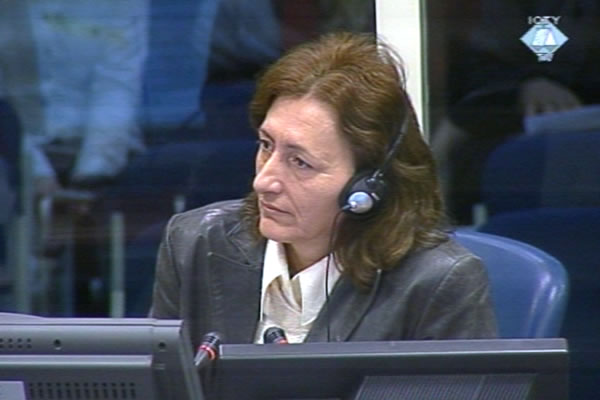Home
KARADZIC’S ‘SARAJEVO GAMBIT’
Through witness Zeljka Malinovic, Radovan Karadzic tried to prove that the BH Army used medical facilities as firing positions. Miladin Trifunovic, another defense witness, doesn’t think it was bad to take Muslim prisoners to do forced work, resulting in casualties; his justification is that they were on the front line side by side with Serb soldiers
 Zeljka Malinovic, defence witness of Radovan Karadzic
Zeljka Malinovic, defence witness of Radovan Karadzic As Radovan Karadzic’s defense case continues, Zeljka Malinovic from Sarajevo testified today. Until the war, Malinovic worked as a nurse in the health care center in Otoka in Novi Grad municipality. In the written statement she gave to Radovan Karadzic’s defense, the witness said that she fled to Nedzarici, also in Sarajevo, in early May 1992 because she feared for her life. There the witness worked in the war infirmary for the Bosnian Serb forces.
Malinovic contends that Serbs in Sarajevo were abused, accused of being snipers and taken to make-shift prisons from which they rarely returned. In the summer of 1992, the witness’s father was arrested and taken to a prison where he died in November 1992. The witness claims that the BH Army constantly violated ceasefires and blamed Serbs for the incidents. The VRS troops only defended themselves, the witness maintained. To illustrate how medical facilities were used as firing positions, the witness described how she saw the Patriotic League soldiers firing on the Viktor Bubanj military barracks from a window in the health care center in Otoka.
The witness admitted in the cross-examination that she personally didn’t see the abuse of Serbs in Sarajevo. In her statement, Malinovic described an incident in which Muslim forces tortured Slavisa Kravljaca in Alipasino Polje in late April 1992. Soldiers hammered nails under Kravljaca’s fingernails and Malinovic’s neighbors purportedly stoned him. This, the witness said, she ‘heard from the neighbors’ whose names she forgot because she didn’t want to remember bad things. The witness stuck to her claim that fire was opened on the Viktor Bubanj barracks from the Otoka health care center. The photos of the military barracks shown to the witness by the prosecutor were labeled ‘odd’ because the witness was convinced the military barracks were ‘much bigger’ and that there weren’t so many skyscrapers between the barracks and the health care center blocking the view.
After the witness completed her evidence, presiding judge Kwon warned Karadzic that the evidence about the crimes committed by the other side was not relevant to his case. Evidence about who fired first or whether the warring sides carried out attacks or defended themselves was likewise irrelevant. The presiding judge noted that in the future the Trial Chamber would closely monitor the relevance of the evidence presented by the defense.
Karadzic’s nest witness was Miladin Trifunovic, the first commander of the Vogosca Brigade. Trifunovic testifies with image distortion as a protective measure. Like all previous VRS witnesses, Trifunovic also claimed that his unit was involved only in the defense, firing only at military targets. In the cross-examination, the witness was handed documents showing that his brigade carried out attacks in the Mt. Zuc sector. The witness was adamant that those were not ‘real attacks’ but an attempt to regain lost territory and an expression of the ‘aspiration, desire and longing’ to return to their homes. The prosecutor then showed a document from the Vogosca Brigade about the mop-up operation in three villages in the Zuc sector. When the witness was asked who had lived in those villages, he replied tersely, ‘Muslims’.
The most interesting part of Trifunovic’s evidence so far has been about the Planjina Kuca prison facility. According to the evidence of prosecution witnesses, many Muslims from Vogosca were detained and abused there. Muslims were taken to the front lines to do forced labor and were used as ‘human shields’ during the fighting in Zuc. The witness was confronted not only with the testimonies of those witnesses but with VRS documents which show that the witness personally asked for prisoners to be used for work on the front lines. Four prisoners were killed and seven were injured on that occasion.
Trifunovic tried to justify the events saying he had acted on the orders of the RS Defense Ministry, allowing this practice ‘provided that prisoners were not exposed to danger’. Disregarding the dead and the wounded, the witness said that in his view the prisoners were not endangered because they went to the front lines together with the VRS soldiers. ‘If we worked side by side’, said the witness who was a captain in the former JNA, then it was not contrary to the provisions on the treatment of prisoners.
Trifunovic will complete his evidence on 27 November 2012 after a one-week break at Radovan Karadzic’s trial.
Linked Reports
- Case : Karadzic
- 2012-11-14 SARAJEVO SIEGE UPSIDE DOWN
- 2012-11-13 MORE EVIDENCE ABOUT VRS ‘DEFENSIVE’ OPERATIONS IN SARAJEVO
- 2012-11-13 KARADZIC HOPES ORIC MIGHT HELP HIM
- 2012-11-27 STATUS OF PARAMILITARY TROOPS IN THE VRS
- 2012-11-28 OTHER SIDE’S CRIMES CANNOT BE USED AS DEFENSE
- 2012-11-28 SEE NO EVIL, HEAR NO EVIL
